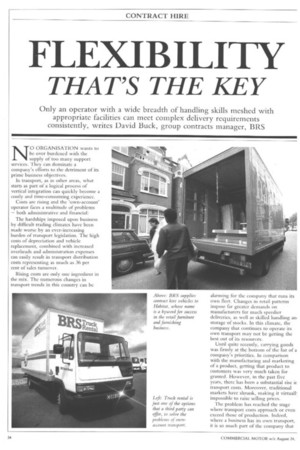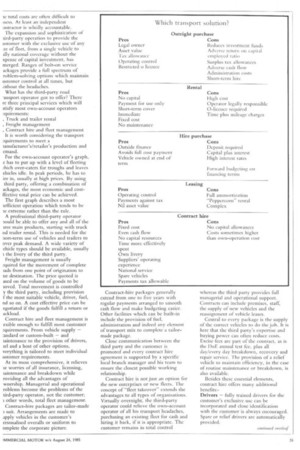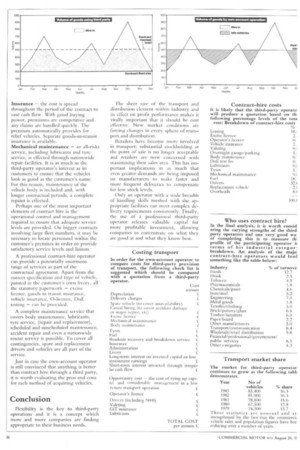FLEXIBILITY
Page 36

Page 37

Page 38

If you've noticed an error in this article please click here to report it so we can fix it.
THAT'S THE KEY
Only an operator with a wide breadth of handling skills meshed with appropriate facilities can meet complex delivery requirements consistently, writes David Buck, group contracts manager, BRS
N0 ORGANISATION wants to be over burdened with the supply of too many support services. They can dominate a company's efforts to the detriment of its prime business objectives.
In transport, as in other areas, what starts as part of a logical process of vertical integration can quickly become a costly and time-consuming experience.
Costs are rising and the 'own-account' operator faces a multitude of problems — both administrative and financial: The hardships imposed upon business by difficult trading climates have been made worse by an ever-increasing burden of transport legislation. The high costs of depreciation and vehicle replacement, combined with increased overheads and administration expenses can easily result in transport distribution costs representing as much as 36 per cent of sales turnover.
Rising costs are only one ingredient in the mix. The numerous changes in transport trends in this country can be alarming for the company that runs its own fleet. Changes in retail patterns impose far greater demands on manufacturers for much speedier deliveries, as well as skilled handling an storage of stocks. In this climate, the company that continues to operate its own transport may not be getting the best out of its resources.
Until quite recently, carrying goods was firmly at the bottom of the list of a company's priorities. In comparison with the manufacturing and marketing of a product, getting that product to customers was very much taken for granted. However, in the past five years, there has been a substantial rise ir transport costs. Moreover, traditional markets have shrunk, making it virtuall impossible to raise selling prices.
The problem has reached the stage where transport costs approach or even exceed those of production. Indeed, where a business has its own transport, it is so much part of the company that le total costs are often difficult to sess. At least an independent antractor is wholly accountable. The expansion and sophistication of aird-party operation to provide the ustomer with the exclusive use of any .ze of fleet, from a single vehicle to ally national coverage without the xpense of capital investment, has merged. Ranges of bolt-on service ackages provide a full spectrum of roblem-solving options which maintain ustomer control at all times, but iithout the headaches.
What has the third-party road
-ansport operator got to offer? There re three principal services which will itisfy most own-account operators tquirernents:
, Truck and trailer rental , Freight management.
, Contract hire and fleet management It is worth considering the transport .•.quireinents to meet a ianufacturer's/retailer's production and emand.
For the own-account operator's graph,
e has to put up with a level of fleeting /Inch overcaters fOr troughs and leaves chides idle. In peak periods, he has to ire in, usually at high prices. By using third party, offering a combination of ackages, the most economic and costffective total price can be achieved. The first graph describes a most iefficient operation which tends to be le extreme rather than the rule.
A professional third-party operator aould be able to offer any and all of the -tree main products, starting with truck rid trailer rental. This is needed for the sort-term use of vehicles and trailers to over peak demand_ A wide variety of chicle types should be available, usually 1 the livery of the third party.
Freight management is usually quired for the movement of complete >ads from one point of origination to ne destination. The price quoted is ased on the volume of goods to be loved. Total movement is controlled y the third party, including provision f the most suitable vehicle, driver, fuel, rid so on. A cost effective price can he egotiated if the goods fulfill a return or ackload.
Contract hire and fleet management is exible enough to fulfill most customer quirements. From .vehicle supply — 7andartfor custom-built — and iaintenance to the provision of drivers, lel and a host of other options, verything is tailored to meet individual ustomer requirements.
At its most comprehensive, it relieves le worries of all insurance, licensing, iaintenance and breakdown while roviding all the advantages of wnership. Managerial and operational roblems become the problems of the lird-party operator, not the customer; 1 other words, total fleet management. Contract-hire packages are tailor-made 3 suit. Arrangements are made to apply vehicles in the customer's ersOnalised overalls or uniform to omplete the corporate picture.
Contract-hire packages generally extend from one to five years with regular payments arranged to smooth cash flow and make budgeting easier. Other facilities which can be built-in include the provision of fuel, administration and indeed any element of transport mix to complete a tailormade package.
Close communication between the third party and the customer is promoted and every contract hire agreement is supported by a specific local branch manager and his team to ensure the closest possible working relationship.
Contract hire is not just an option for the new enterprises or new fleets. The concept of "fleet takeover" extends the advantages to all types of organisations. Virtually overnight, the third-party operator could relieve the own-account operator of all his transport headaches, purchasing an existing fleet for cash and hiring it back, if it is appropriate. The customer remains in total control whereas the third party provides full managerial and operational support. Contracts can include premises, staff, the supply of new vehicles and the reassignment of vehicle leases.
Central to every package is the supply of the correct vehicles to do the job. It is here that the third party's expertise and buying power can often reduce costs. Excise fees are part of the contract, as is the DoE annual test fee, plus all day/every day breakdown, recovery and repair service. The provision of a relief vehicle to maintain efficiency, in the case of routine maintenance or breakdown, is also available.
Besides these essential elements, contract hire offers many additional benefits: Drivers — fully trained drivers for the customer's exclusive use can be incorporated and close identification with the customer is always encouraged. Spare or relief drivers are automatically provided. Insurance the cost is spread throughout the period of the contract to ease cash flow. With good buying power, premiums are competitive and any claims are handled quickly. The premium automatically provides for relief vehicles. Separate goods-in-transit insurance is available.
Mechanical maintenance an all-risks service, including lubricants and tyre service, is effected through nationwide repair facilities. It is as much in the third-party operator's interest as its customers to ensure that the vehicles look as good as the customer's name. For this reason, maintenance of the vehicle body is included and, with longer contractual periods, a complete repaint is effected.
Perhaps one of the most important elements of contract hire is the operational control and management required to ensure that adequate service levels are provided. On bigger contracts involving large fleet numbers, it may be necessary to locate personnel within the customer's premises in order to provide satisfactory service levels and liaison.
A professional contract-hire operator can provide a potentially enormous range of services as part of the contractual agreement. Apart front the correct specification and type of vehicle, painted in the customer's own livery, all the statutory paperwork excise licence, goods in transit insurance, vehicle insurance, 0-licence, DoE testing can be provided.
A complete maintenance service that covers body maintenance, lubricants, tyre service, (repair and replacement), scheduled and unscheduled maintenance, accident repair and even a nationwide rescue service is possible. To cover all contingencies, spare and replacement drivers and vehicles are all part of the service.
Just in case the own-account operator is still convinced that anything is better than contract hire through, a third party, it is worth evaluating the pros and cons for each method of acquiring vehicles.
Conclusion
Flexibility is the key to third-party operations and it is a concept which more and more companies are finding .appropriate to their business needs.
The sheer size of the transport and distribution clement within industry and its effect on profit performance makes it vitally important that it should be cost effective. New market conditions are forcing changes in every sphere of transport and distribution.
Retailers have become inure involved in transport; substantial stockholding at the point of sale is no longer acceptable and ,retailers are now concerned with maximising their sales area. This has important implications in as much that even greater demands are being imposed on manufacturers to make faster and more frequent deliveries to compensate for low stock levels.
Only an operator with a wide breadth of handling skills meshed with the appropriate facilities can meet complex delivery requirements consistently. Finally, the use of a professional third-party operator releases valuable capital for more profitable investment, allowing companies to concentrate on what they are good at and what they know best.




































































